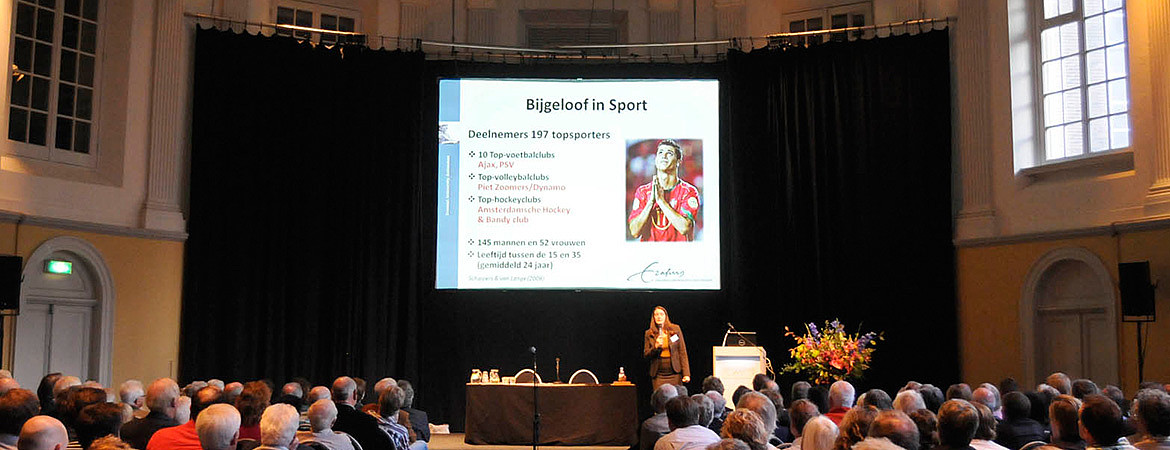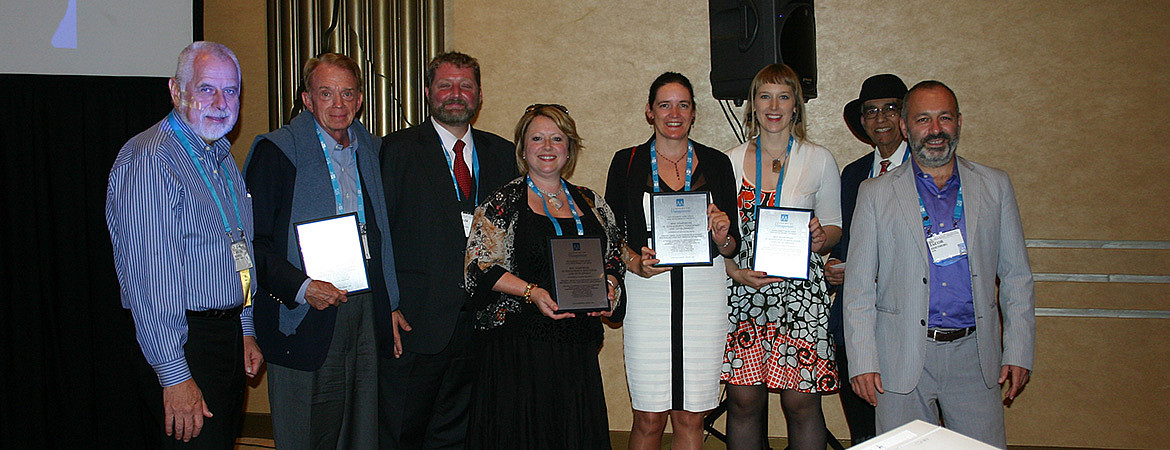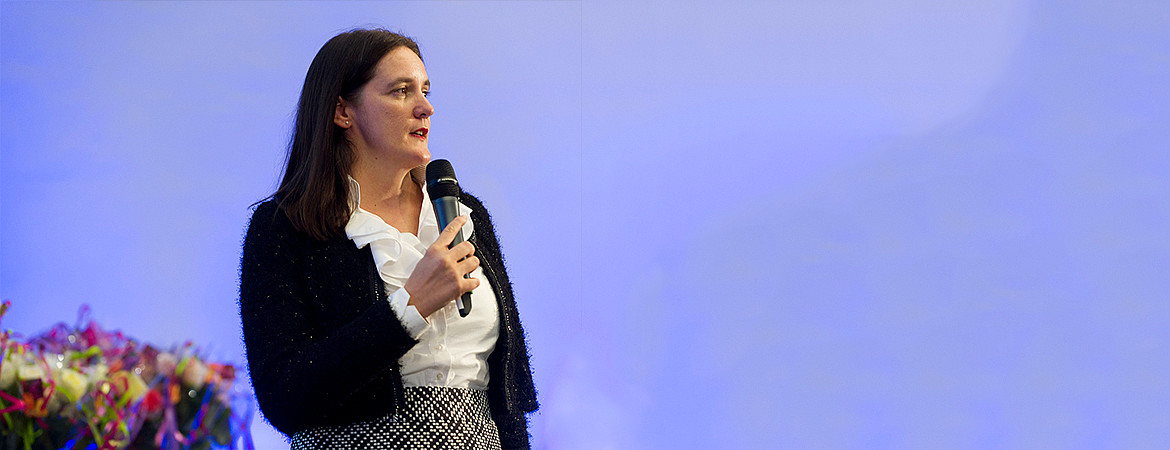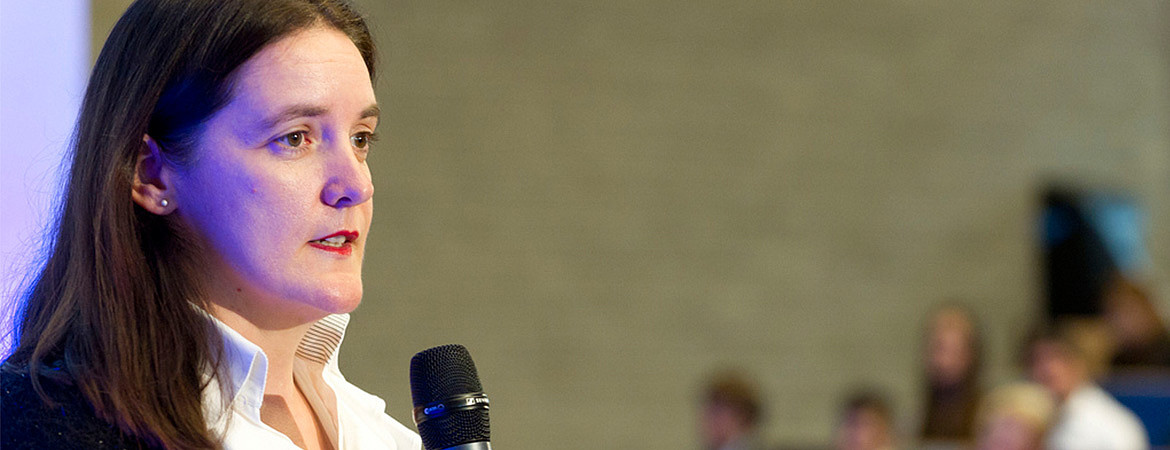prof.dr. M.C. (Michaéla) Schippers

Michaéla Schippers is Professor of Behaviour and Performance Management at Rotterdam School of Management, Erasmus University Rotterdam, the Netherlands. She holds a PhD from the Psychology Department at the Free University in Amsterdam. Prof. Schippers research interest covers goalsetting, team reflexivity, team performance, academic performance as well as ikigai (i.e. purpose in life), and life goals. She coined the term “life crafting” as a way to optimize performance and happiness. Other research interests include diversity, new ways of working, and social exclusion/inclusion. Her work was published in several leading academic journals, such as Annual Review of Psychology, Administrative Science Quarterly, Journal of Management, Journal of Management Studies, Personnel Psychology, Academy of Management Learning & Education, Journal of Organizational Behavior, European Journal of Work and Organizational Psychology, Frontiers in Psychology and Human Relations. Her work was picked up by the media on several occasions. She did interviews with among others CNN, New York Magazine, Oprah Magazine, Eindbazen podcast and NTR radio. A short video of her 2017 inaugural speech can be found here. The full video is available via click here. Dr. Schippers was a visiting scholar at Harvard Business School. She is also an active member of the EER research database. Dr. Schippers is scientific director of the Erasmus Center of Study and Career Success (E=CS2) and Comenius Senior Fellow.
Publications
Article (48)
-
Academic (44)
-
Hudig, J., Scheepers, A. W. A., Schippers, M., & Smeets, G. (2025). Goalsetting is mindsetting: Guided reflection on life goals taps into the plasticity of motivational mindsets. Psychological Reports, 128(4), 2710-2731. Advance online publication. https://doi.org/10.1177/00332941231180813
-
Santos, C. M., Uitdewilligen, S., van der Vegt, L., Schippers, M. C., & Passos, A. M. (2025). Directed but Reflecting: Guided Team Reflexivity as an Intervention to Foster Team Performance Improvement Under Directive Leadership. Group and Organization Management. Advance online publication. https://doi.org/10.1177/10596011251323984
-
Schweitzer, VM., Gerpott, FH., Lehmann-Willenbrock, N., de Leeuw, S., Schippers, M., & Lu, J. (2025). Cracks in the Foundation: How Relational Communication Dynamics Predict Performance Improvement in Cross-Functional Teams. Journal of Supply Chain Management. Advance online publication. https://doi.org/10.1111/jscm.12341
-
Kepp, K. P., Bardosh, K., De Bie, T., Emilsson, L., Greaves, J., Lallukka, T., Muka, T., Rangel, J. C., Sandström, N., Schippers, M. C., Schmidt-Chanasit, J., & Vaillancourt, T. (2024). Zero-covid advocacy during the COVID-19 pandemic: a case study of views on Twitter/X. Monash bioethics review, 42(2), 169-199. https://doi.org/10.1007/s40592-024-00205-2
-
Dekker, I., Schippers, M., & Van Schooten, E. (2023). Reflective Goal-setting Improves Academic Performance in Teacher and Business Education: A Large-scale Field Experiment. Journal of Research on Educational Effectiveness, 17(3), 561-589. https://doi.org/10.1080/19345747.2023.2231440
-
Hudig, J., Scheepers, A., Schippers, M., & Smeets, G. (2022). Motivational mindsets, mindset churn and academic performance: The role of a goal-setting intervention and purpose in life. Current Psychology, 42(27), 23349-23368. https://doi.org/10.1007/s12144-022-03462-8
-
Hudig, J., Scheepers, A. W. A., Schippers, M. C., & Smeets, G. (2021). Motives for studying and student wellbeing: Validation of the motivational mindset model. Frontiers in Psychology, 12, Article 753987. https://doi.org/10.3389/fpsyg.2021.753987
-
Freyhofer Alarcon, SA., Ziegler, N., de Jong, E. M., & Schippers, M. C. (2021). Depression and Anxiety in Times of COVID-19: How Coping Strategies and Loneliness Relate to Mental Health Outcomes and Academic Performance. Frontiers in Psychology, 12, 682684. Article 682684. https://doi.org/10.3389/fpsyg.2021.682684
-
Gabelica, C., De Maeyer, S., & Schippers, M. C. (2021). Taking a Free Ride: How Team Learning Affects Social Loafing. Journal of Educational Psychology, 114(4), 716-733. https://doi.org/10.1037/edu0000713
-
van Neerijnen, P., Figge, P., Tempelaar, M. P., & Schippers, M. (2021). Ambidexterity: Size matters! Reflexive climate and organizational TMS’s influence and the contingent effect of size. Journal of Small Business Management. Advance online publication. https://doi.org/10.1080/00472778.2021.1981917
-
Schippers, M. C., & Rus, D. C. (2021). Majority Decision-Making Works Best Under Conditions of Leadership Ambiguity and Shared Task Representations. Frontiers in Psychology, 12, Article 519295. https://doi.org/10.3389/fpsyg.2021.519295
-
Konradt, U., Schippers, M. C., Krys, S., & Fulmer, A. (2021). Teams in Transition: A Three-Wave Longitudinal Study of Reflection, Implicit and Explicit Coordination and Performance Improvements. Frontiers in Psychology, 12, Article 677896. https://doi.org/10.3389/fpsyg.2021.677896
-
Hudig, J., Scheepers, AWA., Schippers, M., & Smeets, G. (2020). Motivational mindsets and reasons for studying: development and validation of a classification tool. Frontiers in Psychology, 11, Article 535801. https://doi.org/10.3389/fpsyg.2020.535801
-
de Jong, E. M., Ziegler, N., & Schippers, M. C. (2020). From Shattered Goals to Meaning in Life: Life Crafting in Times of the COVID-19 Pandemic. Frontiers in Psychology, 11, Article 577708. https://doi.org/10.3389/fpsyg.2020.577708
-
Schippers, M. C., Morisano, D., Locke, E. A., Scheepers, A. W. A., Latham, G. P., & de Jong, E. M. (2020). Writing about personal goals and plans regardless of goal type boosts academic performance. Contemporary Educational Psychology, 60, Article 101823. https://doi.org/10.1016/j.cedpsych.2019.101823
-
Alexiou, A., Schippers, M. C., Oshri, I., & Angelopoulos, S. (2020). Narrative and aesthetics as antecedents of perceived learning in serious games. Information Technology and People, 35(8), 142-161. https://doi.org/10.1108/ITP-08-2019-0435
-
Schippers, M. C., Rauch, A., Belschak, F. D., & Hulsink, W. (2019). Entrepreneurial Intentions of Teams: Sub-Dimensions of Machiavellianism Interact With Team Resilience. Frontiers in Psychology, 10, Article 2607. https://doi.org/10.3389/fpsyg.2019.02607, https://doi.org/10.3389/fpsyg.2019.02607
-
Wessels, C., Schippers, M., Stegmann, S., Bakker, A. B., Baalen, P., & Proper, K. I. (2019). Fostering flexibility in the new world of work: A model of time-spatial job crafting. Frontiers in Psychology, 10, Article 505. https://doi.org/10.3389/fpsyg.2019.00505
-
Backmann, J., Weiss, M., Schippers, M., & Hoegl, M. (2019). Personality factors, student resiliency, and the moderating role of achievement values in study progress. Learning and Individual Differences, 72, 39-48. https://doi.org/10.1016/j.lindif.2019.04.004
-
Lee, K. Y., Duffy, M. K., Scott, K. L., & Schippers, M. (2018). The experience of being envied at work: How being envied shapes employee feelings and motivation. Personnel Psychology, 71(2), 181-200. https://doi.org/10.1111/peps.12251
-
Alexiou, A., & Schippers, M. (2018). Digital game elements, user experience and learning: A conceptual framework. Education and Information Technologies, 23(6), 2545-2567. https://doi.org/10.1007/s10639-018-9730-6
-
Alexiou, A., Khanagha, S., & Schippers, M. (2018). Productive organizational energy mediates the impact of organizational structure on absorptive capacity. Long Range Planning, 52(2), 155-172. https://doi.org/10.1016/j.lrp.2018.02.001
-
Otte, K.-P., Konradt, U., Garbers, Y., & Schippers, M. (2016). Development and validation of the REMINT: a reflection measure for individuals and teams. European Journal of Work and Organizational Psychology, 26(2), 299-313. https://doi.org/10.1080/1359432X.2016.1261826
-
Konradt, U., Otte, K. P., & Schippers, M. (2016). Reflexivity in teams - a review and new perspectives. The Journal of Psychology, 150(2), 153-174. https://doi.org/10.1080/00223980.2015.1050977
-
Schippers, M., Scheepers, AWA., & Peterson, J. B. (2015). A scalable goal-setting intervention closes both the gender and minority achievement gap. Palgrave Communications (online), 1, 15014. https://doi.org/10.1057/palcomms.2015.14
-
Konradt, U., Schippers, M., Garbers, Y., & Steenfatt, C. (2015). Effects of guided reflection and feedback on team performance improvement: The role of team regulatory processes and emergent cognitive states. European Journal of Work and Organizational Psychology, 24(5), 777-795. https://doi.org/10.1080/1359432X.2015.1005608
-
Schippers, M., West, MA., & Dawson, JF. (2015). Team reflexivity and innovation: The moderating role of team context. Journal of Management, 41(3), 769-788. https://doi.org/10.1177/0149206312441210
-
Scott, K. L., Tams, S., Schippers, M., & Lee, K. Y. (2015). Opening the black box: Why and when workplace exclusion affects social reconnection behavior, health and attitudes. European Journal of Work and Organizational Psychology, 24(2), 239-255. https://doi.org/10.1080/1359432X.2014.894978
-
Schippers, M., Edmondson, A. C., & West, M. A. (2014). Team reflexivity as an antidote to team information processing failures. Small Group Research, 45(6), 731-769. https://doi.org/10.1177/1046496414553473
-
Scott, K. L., Zagenczyk, T. J., Schippers, M., & Purvis, R. L. (2014). Coworker exclusion and employee outcomes: The moderating role of perceived organizational and social support. Journal of Management Studies, 51(8), 1235-1256. https://doi.org/10.1111/joms.12099
-
Schippers, M. (2013). Social loafing tendencies and team performance: The compensating effect of agreeableness and conscientiousness. Academy of Management Learning & Education, 13(1), 62-81. https://doi.org/10.5465/amle.2012.0191
-
Schippers, M., Homan, AC., & van Knippenberg, D. (2013). To reflect or not to reflect: Prior team performance as a boundary condition of the effects of reflexivity on learning and final team performance. Journal of Organizational Behavior, 34(1), 6-23. https://doi.org/10.1002/job.1784
-
Alexiou, A., Schippers, M., & Oshri, I. (2012). Positive psychology and digital games: the role of emotions and psychological flow in serious games development. Psychology, 3(12A), 1243-1247. https://doi.org/10.4236/psych.2012.312A184
-
Van Lange, PAM., Schippers, M., & Balliet, D. (2011). Who volunteers in psychology experiments? A study of prosocial motivation in volunteering. Personality and Individual Differences, 51(3), 279-285. https://doi.org/10.1016/j.paid.2010.05.038
-
Schippers, M., & Hogenes, R. (2011). Energy management of people in organizations. Journal of Business and Psychology, 26, 193-203. https://doi.org/10.1007/s10869-011-9217-6
-
Sasovova, Z., Mehra, A., Borgatti, S. P., & Schippers, M. (2010). Network Churn: The Effects of Self-Monitoring Personality on Brokerage Dynamics. Administrative Science Quarterly, 55(4), 639-670. https://doi.org/10.2189/asqu.2010.55.4.639
-
Nederveen Pieterse, A., van Knippenberg, D., Schippers, M., & Stam, D. (2010). Transformational and transactional leadership and innovative behavior: The moderating role of psychological empowerment. Journal of Organizational Behavior, 31(4), 609-623. https://doi.org/10.1002/job.650
-
Widmer, PS., Schippers, M., & West, MA. (2009). Recent developments in reflexivity research: A review. Psychology, 2(2), 2-11.
-
Schippers, M., den Hartog, DN., Koopman, PL., & van Knippenberg, D. (2008). The role of transformational leadership in enhancing team reflexivity. Human Relations, 61(11), 1593-1616. https://doi.org/10.1177/0018726708096639
-
van Knippenberg, D., & Schippers, M. (2007). Work group diversity. Annual Review of Psychology, 58, 515-541. https://doi.org/10.1146/annurev.psych.58.110405.085546
-
Schippers, M., den Hartog, DN., & Koopman, PL. (2007). Reflexivity in teams: A measure and correlates. Applied Psychology, 56(2), 189-211. https://doi.org/10.1111/j.1464-0597.2006.00250.x
-
Schippers, M. (2006). The psychological benefits of superstitious rituals in top sport: A study among top sportspersons. Journal of Applied Social Psychology, 36(10), 2532-2553. https://doi.org/10.1111/j.0021-9029.2006.00116.x
-
Schippers, M., den Hartog, DN., Koopman, PL., & Wienk, JA. (2003). Diversity and team outcomes: the moderating effects of outcome interdependence and group longevity and the mediating effect of reflexivity. Journal of Organizational Behavior, 24(6), 779-802. https://doi.org/10.1002/job.220
-
den Hartog, DN., Schippers, M., & Koopman, PL. (2002). The impact of leader behavior on trust in management and co-workers. SA Journal of Industrial Psychology, 28(4), 29-34.
-
-
Professional (4)
-
van Baalen, P., van der Meulen, N., Bouwman, J., & Schippers, M. (2012). Task-location optimization in the Hybrid Workspace. Tijdschrift voor Ergonomie, 37(3), 28-32.
-
Schippers, M. (2012). Why team reflexivity works. RSM Insight, 12(4), 18-19. http://hdl.handle.net/1765/40121
-
Schippers, M., Rook, L., & van de Velde, S. (2011). Crisis performance predictability in supply chains. RSM Insight, 7(3), 10-11. http://hdl.handle.net/1765/39946
-
Schippers, M., den Hartog, DN., & Koopman, PL. (2005). Reflexiviteit van teams: Ontwikkeling van een instrument. Gedrag en Organisatie, 18(2), 83-102.
-
Chapter (7)
-
Academic (7)
-
Schippers, M. C., & Scheepers, A. W. A. (2019). Individual motivation, team learning, and performance in collaborative academic contexts. In Individual Motivation within Groups: Social Loafing and Motivation Gains in Work, Academic, and Sports Teams (pp. 81-108). Elsevier Inc.. https://doi.org/10.1016/B978-0-12-849867-5.00003-3
-
Wessels, C., & Schippers, M. (2018). Reflecting on and proactively making use of flexible working practices makes all the difference: The role of spatial job crafting. In Work, Working and Work Relationships in a Changing World (pp. 77-93). Taylor and Francis Inc..
-
Schippers, M. C., Edmondson, A. C., & West, M. A. (2017). Team reflexivity. In The Oxford Handbook of Group and Organizational Learning (pp. 175-193). Ithaca/Oxford University Press.
-
Schippers, M., West, M. A., & Edmondson, A. C. (2016). Team reflexivity and innovation. In The Wiley Blackwell Handbook of the Psychology of Teamwork and Collaborative Processes Wiley-Blackwell.
-
De Leeuw, S., Schippers, M., & Hoogervorst, S. (2016). The Fresh Connection: Cross-functional integration in Supply Chain Management. In E. Bendoly, W. VanWezel, & D. G. Bachrach (Eds.), Handbook of Behavioral Operations Management: Social and psychological dynamics in production and service settings Oxford.
-
De Leeuw, S., Schippers, M. C., & Hoogervorst, S. J. (2015). The Fresh Connection: Cross-Functional Integration in Supply Chain Management. In The Handbook of Behavioral Operations Management: Social and Psychological Dynamics in Production and Service Settings Ithaca/Oxford University Press. https://doi.org/10.1093/acprof:oso/9780199357215.003.0017
-
Schippers, M. (2001). Reflexiviteit als hulpmiddel. In H. Korevaar, Y. Politiek, & P. Spruit (Eds.), Managers en teams Samson.
-
Conference contribution (8)
-
Academic (8)
-
Dolgova, E., & Schippers, M. (2015). Co-evolution of perceptions of competence and friendship in teams: the effect of self-monitoring personality.. Annual Meeting of the International Network for Social Network Analysis (Sunbelt Conference), Brighton, UK.
-
Alexiou, A., Schippers, M., & Oshri, I. (2013). Exploring the learning potential of serious games: The role of game features and individual differences in user engagement and learning.. 29th EGOS (European Group of Organization Studies) Colloquium, Montreal, Canada.
-
Alexiou, A., Schippers, M., Oshri, I., & Dolgova, E. (2013). Exploring the real potential of serious games: The role of game features and individual differences on user engagement and learning.. EGOS Colloquium, Montreal, Canada.
-
Neerijnen, P., Schippers, M., Tempelaar, M., & Figge, P. (2012). Creating performance through ambidexterity: The role of an organizational transactive memory system and organizational reflexive climate. Best paper proceedings Academy of Management Conference, Boston, United States..
-
Neerijnen, P., Tempelaar, MP., Schippers, M., & Figge, P. (2012). Creating performance through ambidexterity: The role of a firm’s organizational transactive memory system and organizational reflexive climate. Annual Academy of Management Conference, Boston, USA, included in <i>The Academy of Management Best Paper Proceedings</i>.
-
Neerijnen, P., Tempelaar, MP., Schippers, M., & Figge, P. (2012). Creating performance through ambidexterity: The role of a firm’s organizational transactive memory system and organizational reflexive climate. EURAM, Rotterdam, NL.
-
Dolgova, E., & Schippers, M. (2012). The effect of self-monitoring personality and expertise on relationship formation in groups.. European Academy of Management Annual Meeting (EURAM), Rotterdam, the Netherlands.
-
Dolgova, E., & Schippers, M. (2012). Birds of a feather 2.0: Is there a personality-based homophily?. NYU Stern Medici Summer School 2012, Florence, Italy.
-
Conference proceeding (3)
-
Academic (3)
-
Kismihók, G., Zhao, C., Schippers, M. C., Mol, S. T., Harrison, S., & Shehata, S. (Accepted/In press). Translating the concept of goal setting into practice: What 'else' does it require than a goal setting tool? In H. C. Lane, S. Zvacek, & J. Uhomoibhi (Eds.), CSEDU 2020 - Proceedings of the 12th International Conference on Computer Supported Education (pp. 388-395). SciTePress. https://doi.org/10.48550/arXiv.2005.08669
-
Wessels, C., Schippers, M., & Baalen, P. (2013). "Getting Engaged: It is more than saying 'yes'to your organization. How work engagement and its influencers affect Work-Life Balance and Job Satisfaction and the Moderating Role of Flexibl Working. In Proceedings of EAWOP
-
Schippers, M., & Homan, A. (2009). Breaking the negative performance spiral: The role of reflexivity and team learning. In Best paper proceedings Academy of Management, Chicago
-
Inaugural speech (1)
-
Popular (1)
-
Schippers, M. (2017). IKIGAI: Reflection on Life Goals Optimizes Performance and Happiness. Erasmus Research Institute of Management (ERIM). Inaugural Addresses Research in Management Series http://hdl.handle.net/1765/100484
-
Paper (3)
-
Academic (3)
-
Van Neerijnen, P., Schippers, M. C., Tempelaar, M., & Figge, P. (2012). Creating performance through ambidexterity: The role of a firm's organizational transactive memory system and organizational reflexive climate. 1761-1766. Paper presented at 72nd Annual Meeting of the Academy of Management, AOM 2012, Boston, United States. https://doi.org/10.5465/AMBPP.2012.256
-
Schippers, M. C., West, M., & Dawson, J. (2010). Team reflexivity and innovation: The moderating role of team context. Paper presented at 70th Annual Meeting of the Academy of Management - Dare to Care: Passion and Compassion in Management Practice and Research, AOM 2010, Montreal, QC, Canada. https://doi.org/10.5465/ambpp.2010.54495674
-
Schippers, M. C., & Homan, A. C. (2009). Breaking the negative performance spiral: The role of team reflexivity and team learning. Paper presented at 69th Annual Meeting of the Academy of Management, AOM 2009, Chicago, IL, United States. https://doi.org/10.5465/ambpp.2009.44261134
-
Review article (6)
-
Academic (2)
-
Schippers, M. C. (2020). For the Greater Good? The Devastating Ripple Effects of the Covid-19 Crisis. Frontiers in Psychology, 11, Article 577740. https://doi.org/10.3389/fpsyg.2020.577740, https://doi.org/10.3389/fpsyg.2020.577740
-
Schippers, M. C., & Ziegler, N. (2019). Life Crafting as a Way to Find Purpose and Meaning in Life. Frontiers in Psychology, 10, Article 2778. https://doi.org/10.3389/fpsyg.2019.02778, https://doi.org/10.3389/fpsyg.2019.02778
-
-
Popular (4)
-
Schippers, M. C., Ioannidis, J. P. A., & Luijks, M. W. J. (2024). Is society caught up in a Death Spiral? Modeling societal demise and its reversal. Frontiers in Sociology, 9, Article 1194597. https://doi.org/10.3389/fsoc.2024.1194597
-
Schippers, M. C., Ioannidis, J. P. A., & Joffe, A. R. (2022). Aggressive measures, rising inequalities, and mass formation during the COVID-19 crisis: An overview and proposed way forward. Frontiers in Public Health, 10, Article 950965. https://doi.org/10.3389/fpubh.2022.950965
-
Schippers, M. C., & Rus, D. C. (2021). Optimizing Decision-Making Processes in Times of COVID-19: Using Reflexivity to Counteract Information-Processing Failures. Frontiers in Psychology, 12, 650525. Article 650525. https://doi.org/10.3389/fpsyg.2021.650525
-
Dekker, I., De Jong, E. M., Schippers, M. C., De Bruijn-Smolders, M., Alexiou, A., & Giesbers, B. (2020). Optimizing Students’ Mental Health and Academic Performance: AI-Enhanced Life Crafting. Frontiers in Psychology, 11, Article 1063. https://doi.org/10.3389/fpsyg.2020.01063
-
Teaching case (1)
-
Academic (1)
-
Nikolopoulou, K., Van Koert, M., & Schippers, M., (2020). Closing the Gap: Goal-setting Programme at the Rotterdam University of Applied Sciences, 18 p., RSM Case Development Centre http://hdl.handle.net/1765/130523
-
Working paper (2)
-
Academic (1)
-
Schippers, M., de Jong, E. M., Rus, D. C., Rommers, H., & Banerjee, S. (2024). Letters to the Future Challenge: A Scalable Online Tool to Engage Management Students with the SDGs. Rotterdam School of Management (RSM), EUR. Erim Report Series in Management
-
-
Professional (1)
-
Schippers, M., van Tulder, R., Louwerse, M. M., & Panas, D. C. (2025). Engaging Students with Sustainable Development Goals: A Performative Educational Toolkit with Virtual Reality Simulations, Letters to the Future and an SDG Strategy Assignment. Erasmus University Rotterdam (EUR).
-
PhD Tracks (11)

- Role: Promotor
- PhD Candidate: Andreas Alexiou
- Time frame: 2010 - 2016

- Role: Member Doctoral Committee
- PhD Candidate: Nick van der Meulen
- Time frame: 2011 - 2016

- Role: Co-promotor
- PhD Candidate: Christina Wessels
- Time frame: 2013 - 2017

- Role: Promotor

- Role: Promotor
- PhD Candidate: Evgenia Dolgova
- Time frame: 2007 - 2019

- Role: Member Doctoral Committee
- PhD Candidate: Saeedeh Ahmadi
- Time frame: 2014 - 2019

- Role: Promotor

- Role: Promotor

- Role: Promotor
- PhD Candidate: Sebastian Freyhofer
- Time frame: 2019 -

- Role: Promotor
- PhD Candidate: Juan Carlos Martinez Delgado
- Time frame: 2018 -

- Role: Member Doctoral Committee
- PhD Candidate: Guillem Casoliva-i-Cabana
- Time frame: 2016 - 2024
Events (12)
Awards (2)
- ERIM Award for Impact on Management Practice (2017)
- ERIM Impact Award (2010)
Address
Office: T10-44
Burgemeester Oudlaan 50
3062 PA Rotterdam
Postbus 1738
3000 DR Rotterdam
Netherlands







